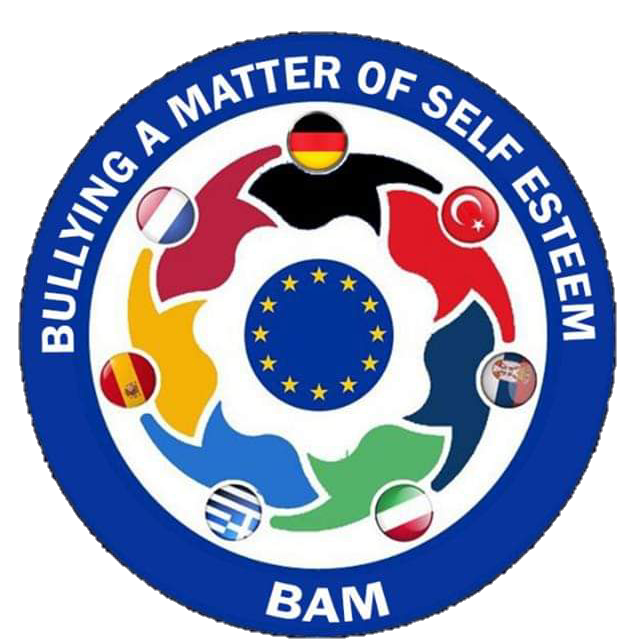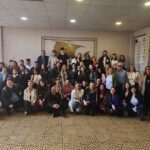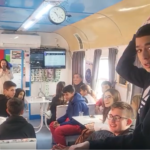Interview with Anastasia and Konstantina from Greece

Anastasia (16) and Konstantina (17) are two students from our Greek partner school in Piraeus (Greece) near Athens. Together they are taking part in the Erasmus project meeting “Bullying a matter of self-esteem” at Sophie-Scholl-Berufskolleg (SBK). In an interview with Daniel Kober, teacher at SBK, they explain why they are taking part in the project and what their own experiences of bullying have been. Interesting similarities emerge between the two.
Kober: Konstantina, thank you very much for agreeing to do this interview. What motivated you to take part in this Erasmus project?
Konstantina: I really like meeting new people and exchanging ideas with them. You get to know new characters and perspectives on the world.
Kober: During our break earlier, you led a Greek dance with Anastasia. You seem to be very open to new people.
Konstantina: I can only do that when I feel safe in my surroundings. We were welcomed here at the school with open arms. All the teachers and students are so friendly to us, we laugh together and it’s just fun to work together on the project. For a long time, I couldn’t do that at all and there are still situations today where I find it difficult.
Kober: Why do you think it is like that?
Konstantina: Even in elementary school I was an outsider and I basically had no friends. Although I wasn’t actively bullied with insults or even physically bullied, I was more or less left on the sidelines. I wasn’t noticed and when I tried to make contact, it was simply “absorbed” by a popular person.
Kober: Being alone at such a young age must have been tough for you.
Konstantina: Yes, I always wondered if I was wrong and why nobody liked me. I’m actually an introverted person, unlike what you saw today. As a child, I was very withdrawn, I had other interests and good grades. Maybe that made me very unapproachable to others.
Kober: It seems that you have slowly worked your way out of your difficult situation. How did you manage that?
Konstantina: My parents were very attentive. They recognized that I wasn’t doing well and spoke to me about it. This gave me the opportunity to tell them about my bullying problems. The bullying continued more actively at secondary school. The parents spoke to my the headmaster, he had a conversation with the people who were bullying me and things were much better after that.
Kober: Do you think there are people who are more likely to be bullied?
Konstantina: Yes, I think so. It’s usually the introverted and quiet people who are the victims of bullying. They are less outgoing, show little resistance and have fewer social contacts or smaller social groups. Bullied people know how to hide. On the outside they express that everything is okay, but on the inside they are suffering.
Kober: From your point of view, how can bullied people be helped?
Konstantina: Others should look closely and seek a conversation. The bullied should confide in at least one person. This is very relieving and help often comes from these people. And if the school ignores calls for help, you have to go one step further. You can’t just ignore it and suffer. Perhaps it makes sense for some bullying victims to seek help from a therapist. Later on, I would also like to work in the psychological field – perhaps as a therapist.
Kober: From being bullied to being a supporter. Thank you, Konstantina, for sharing your thoughts and experiences on the project and the topic of bullying. I would like to continue with Anastasia. Anastasia, I would also like to know from you what motivated you to participate in the Erasmus project.
Anastasia: My goal is to study in another country later on. I am very interested in other countries, cultures and people. That’s why I take advantage of every opportunity to come into contact with international people. I’m very committed to this and now I’m allowed to be here. So first came the international aspect and then the topic of bullying.
Kober: On what level are you interested in the topic of bullying now?
Anastasia: Unfortunately, I was also confronted with bullying at an early age. I was a very sensitive and shy child who cried a lot. I was actually the child who didn’t fit in anywhere. I share Konstantina’s opinion that sensitive and introverted people are more likely to be victims of bullying. Somehow I didn’t fit into any group and had very, very few friends. When I went to secondary school, I was in a different world. The others walked around with make-up and smartphones; I was still more of a child. I thought a lot about how I appeared to others, lost weight and tried to be more open so that others would accept me.
Kober: And did it help you?
Anastasia: Yes and no. I made real friends in the second year of high school. Not because I tried to change myself, but because they liked me for who I am. As a result, I developed trust in others and had a more positive outlook on life overall. People who bully are not stupid. On the contrary, they are quite smart and know how to back their victims into a corner and cover up their actions. My advice is not to pretend and not to give up. You have to keep going, because at some point the people in your life with whom you feel safe and in good hands will turn up. That’s how I feel here, for example. I feel exactly like Konstantina. I received a warm welcome here and am perceived as an expert during our presentations. Others are interested in what I have to say.
Kober: You both really do have something to say. Two strong, young women who give presentations in fluent English in a foreign country and discuss with others. Thank you for the interview and good luck with your goals – whether as a therapist or an international student.






